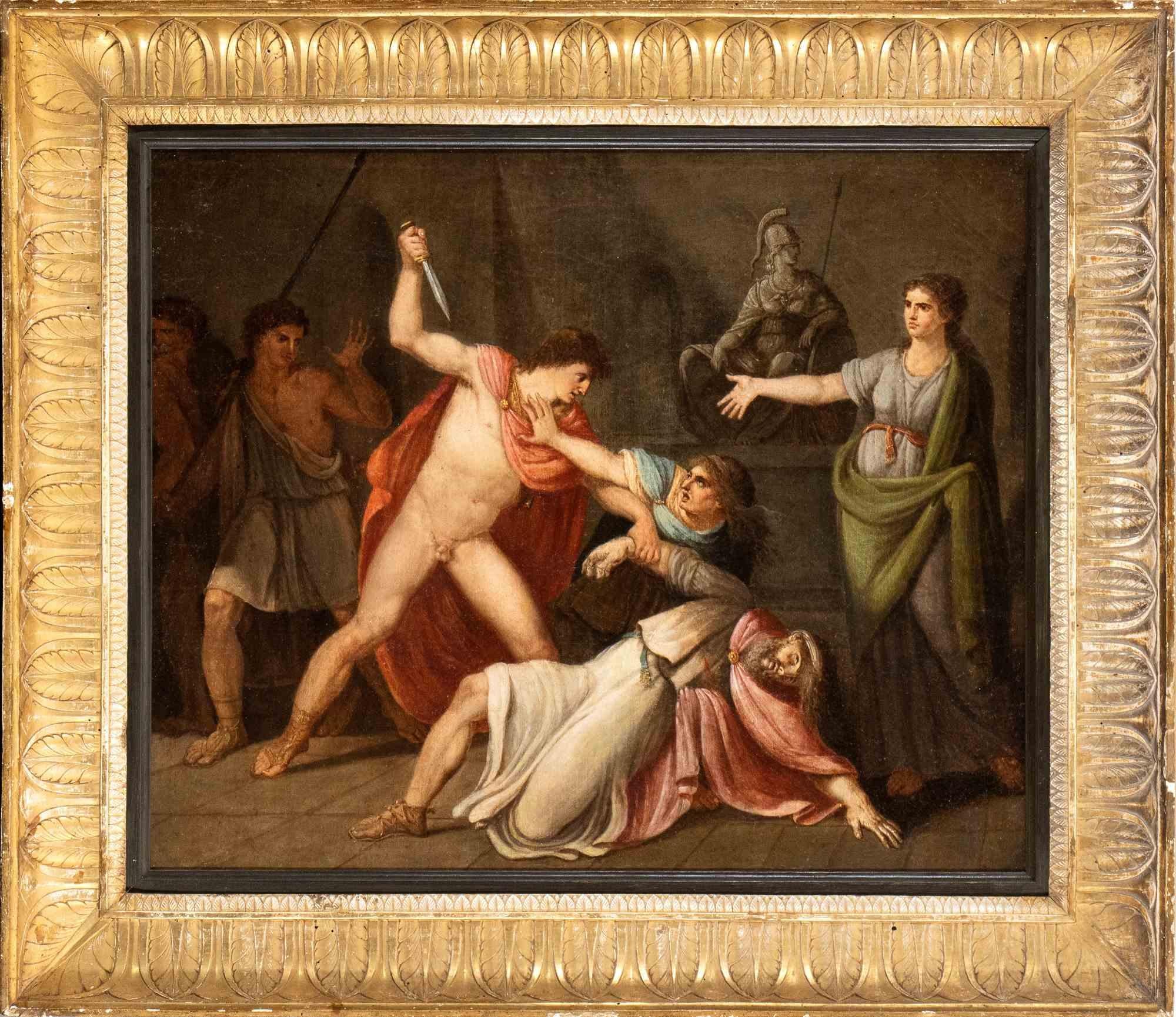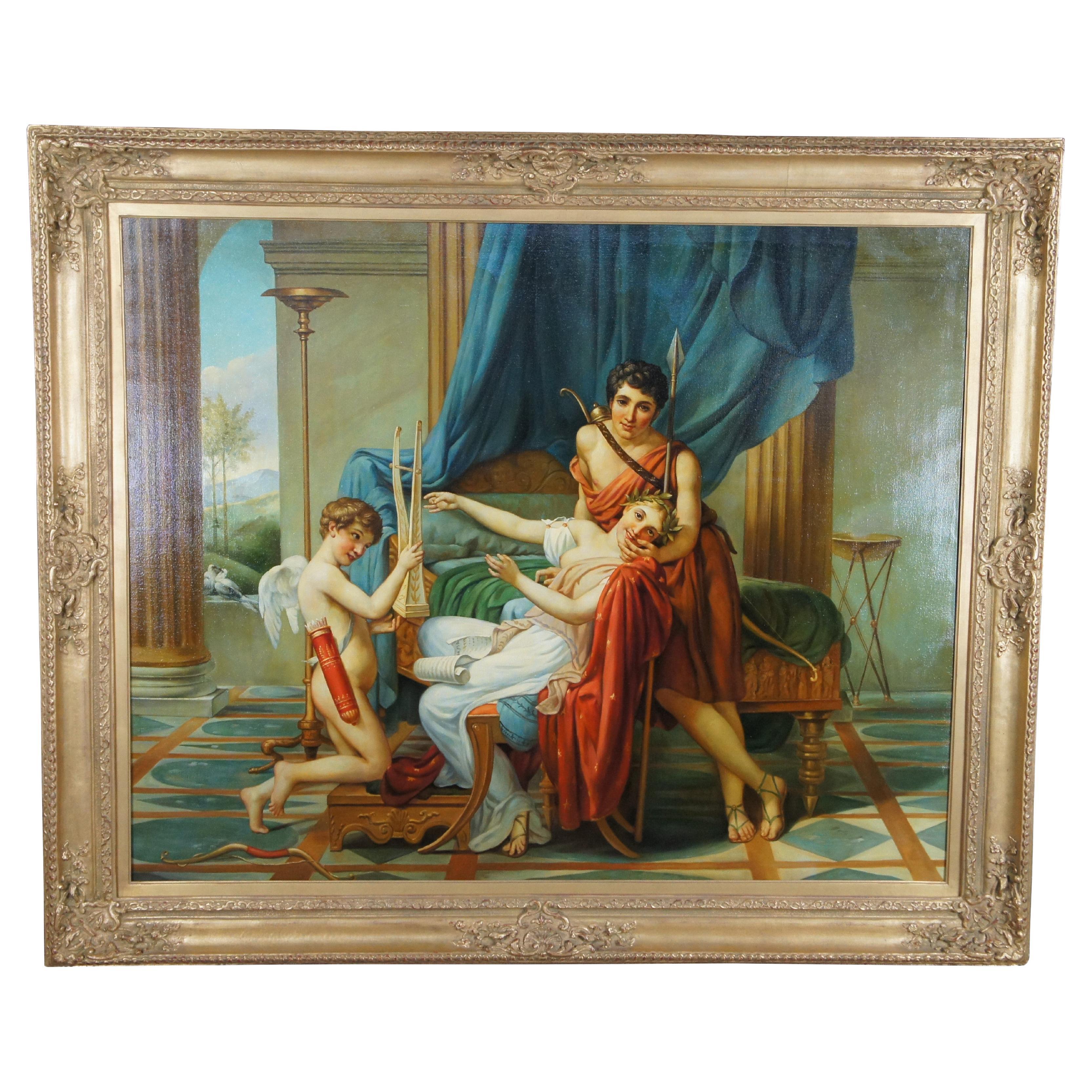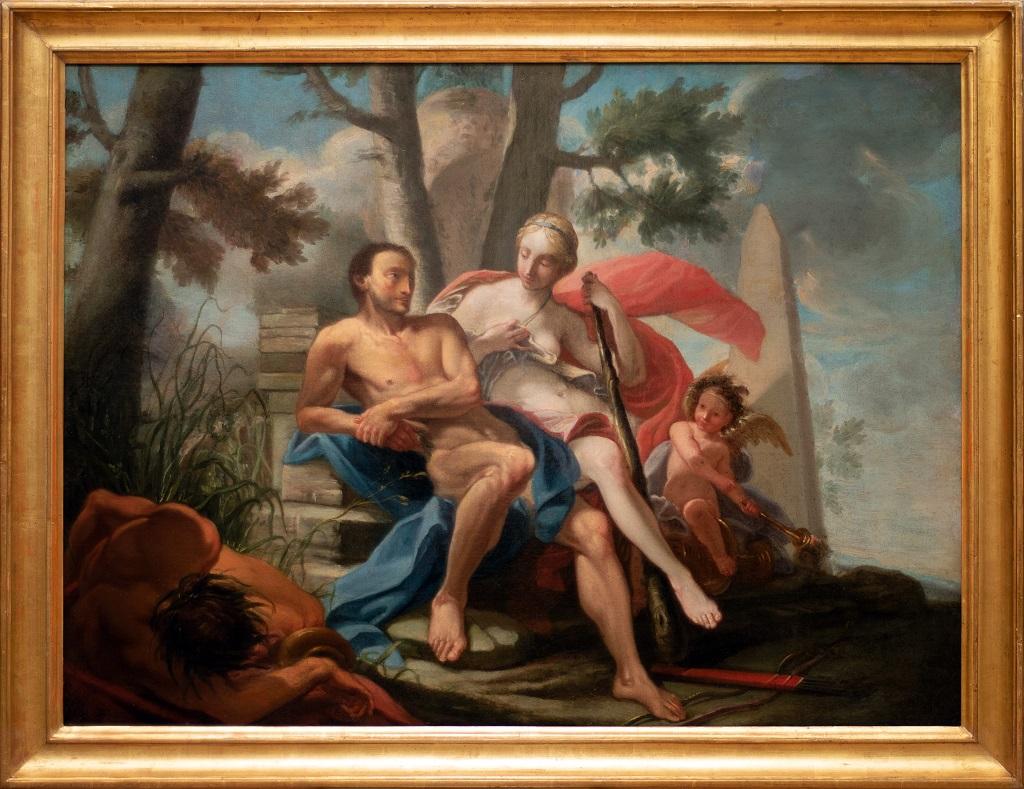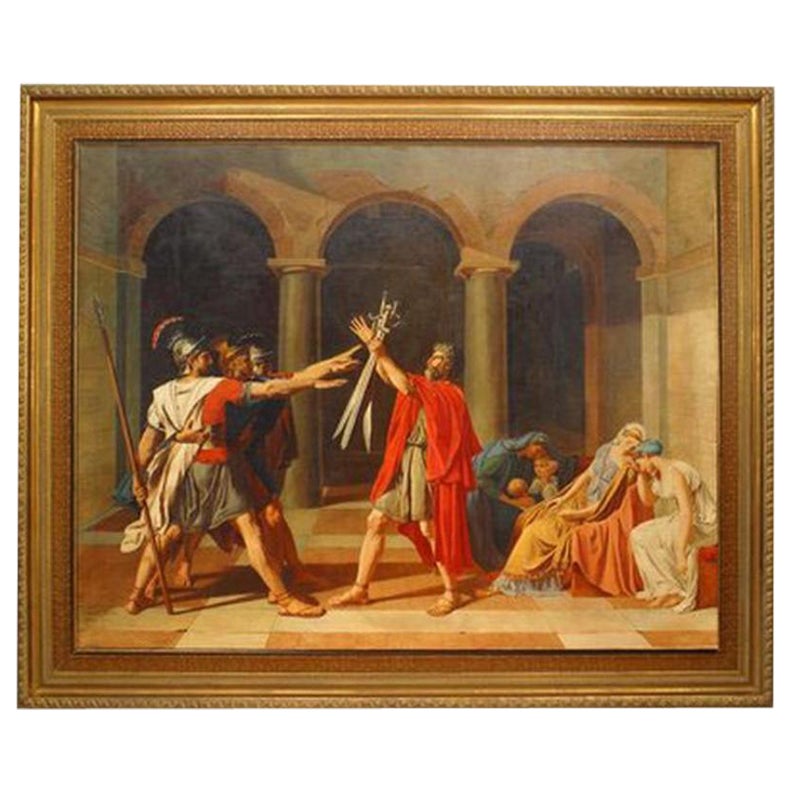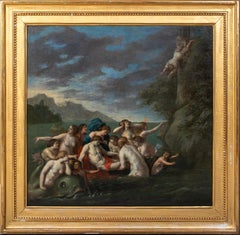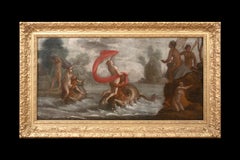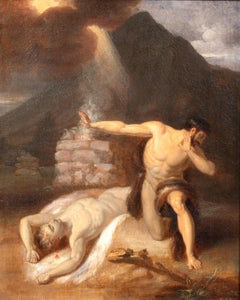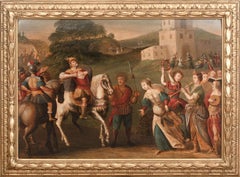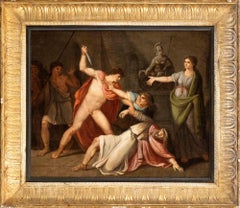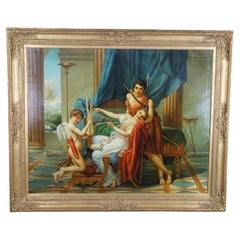Items Similar to The Death Of Patroclus, 18th Century School of Jacques-Louis David (1748-1825)
Want more images or videos?
Request additional images or videos from the seller
1 of 10
The Death Of Patroclus, 18th Century School of Jacques-Louis David (1748-1825)
$6,613.65
$8,267.0620% Off
£4,800
£6,00020% Off
€5,680.37
€7,100.4620% Off
CA$9,112.02
CA$11,390.0220% Off
A$10,152.07
A$12,690.0920% Off
CHF 5,299.86
CHF 6,624.8320% Off
MX$123,259.70
MX$154,074.6320% Off
NOK 66,615.82
NOK 83,269.7720% Off
SEK 62,968.13
SEK 78,710.1620% Off
DKK 42,403.25
DKK 53,004.0620% Off
About the Item
The Death Of Patroclus, 18th Century
School of Jacques-Louis David (1748-1825)
18th Century French Neo-Classical scene of the Death Of Patroclus, oil on panel. Excellent quality and condition scene of the lifeless body of Patroclus carried from the battlefield under the protection of Melanaus and Ajax after being killed and stripped of his armour by Hector. The scene captures the pivotal moment of Homer's Iliad and the Trojan War prompting Achilles to join the Acheans after the death of his beloved friend. The style and period are typical of David and his circle. Presented in its original antique gilt frame.
Provenance: Deceased Estate, Surrey, UK
Measurements: 12" x 10" framed approx
- Dimensions:Height: 10 in (25.4 cm)Diameter: 12 in (30.48 cm)
- Medium:
- Circle Of:Jacques-Louis David (1748 - 1825, French)
- Period:
- Condition:
- Gallery Location:Blackwater, GB
- Reference Number:Seller: 7832951stDibs: LU1577216162422
About the Seller
4.9
Gold Seller
Premium sellers maintaining a 4.3+ rating and 24-hour response times
Established in 2008
1stDibs seller since 2021
294 sales on 1stDibs
Typical response time: 3 hours
- ShippingRetrieving quote...Shipping from: Blackwater, United Kingdom
- Return Policy
Authenticity Guarantee
In the unlikely event there’s an issue with an item’s authenticity, contact us within 1 year for a full refund. DetailsMoney-Back Guarantee
If your item is not as described, is damaged in transit, or does not arrive, contact us within 7 days for a full refund. Details24-Hour Cancellation
You have a 24-hour grace period in which to reconsider your purchase, with no questions asked.Vetted Professional Sellers
Our world-class sellers must adhere to strict standards for service and quality, maintaining the integrity of our listings.Price-Match Guarantee
If you find that a seller listed the same item for a lower price elsewhere, we’ll match it.Trusted Global Delivery
Our best-in-class carrier network provides specialized shipping options worldwide, including custom delivery.More From This Seller
View AllHero And Leander, 17th Century Studio of DAVID II TENIERS (1610-1690)
By David Teniers the Younger
Located in Blackwater, GB
Hero And Leander, 17th Century
Studio of DAVID II TENIERS (1610-1690)
Large 17th century Dutch Old Master classical scene of Hero and Leander, oil on canvas. Excellent quality an...
Category
17th Century Figurative Paintings
Materials
Canvas, Oil
$7,715 Sale Price
20% Off
The Triumph Of Galatea, 19th Century follower of Scarsellino (1550-1620)
Located in Blackwater, GB
The Triumph Of Galatea, 19th Century
follower of Scarsellino (1550-1620)
Large 16th 17th Century Italian Old Master of the Triumph of Galatea, oil on canvas. Excellent quality and ...
Category
17th Century Portrait Paintings
Materials
Canvas, Oil
$5,511 Sale Price
20% Off
Cain & The Death Of Abel, 18th Century
By William Blake
Located in Blackwater, GB
Cain & The Death Of Abel, 18th Century
School of William Blake (1757-1827)
Circa 1790 English School depiction of Cain and the Death Of Abel, oil on canvas. Rare biblical depiction...
Category
18th Century Portrait Paintings
Materials
Canvas, Oil
$5,511 Sale Price
20% Off
The Return Of King Agamemnon, 16th Century Frans I FLORIS (1516-1570) Trojan War
Located in Blackwater, GB
The Return Of King Agamemnon, 16th Century
circle of Frans I FLORIS (1516-1570)
Large 16th Century Flemish Old Master depicting the return of King Agamemnon from the Trojan War, o...
Category
16th Century Portrait Paintings
Materials
Oil, Wood Panel
$12,676 Sale Price
20% Off
Judith Beheading Holofernes, 17th Century School of Carlo MARATTA (1625-1713)
By Workshop Of Carlo Maratta
Located in Blackwater, GB
Judith Beheading Holofernes, 17th Century
School of Carlo MARATTA (1625-1713)
Carlo Maratta
Large 17th century Italian Old Master depiction of Jud...
Category
17th Century Portrait Paintings
Materials
Oil, Canvas
$4,960 Sale Price
20% Off
Cain & Abel, 19th Century
Located in Blackwater, GB
Cain & Abel, 19th Century
School of Eugène DELACROIX (1798-1863)
19th century French scene of Cain & Abel, oil panel. Excellent quality and condition biblical scene of the death of...
Category
19th Century Portrait Paintings
Materials
Oil, Wood Panel
$3,857 Sale Price
20% Off
You May Also Like
The Death of Priam - Oil Paint - Early 19th Century
Located in Roma, IT
Oil on canvas realized by an italian neoclassical artist in th early 19th Century.
In very good condition, it includes a coeval gilded wooden frame.
Category
Early 19th Century Modern Figurative Paintings
Materials
Oil
18th Century Neoclassical Oil Painting of the Trojan War: Briseis & Achilles
By James Thornhill
Located in London, GB
James Thornhill (1674-1735)
Oil on canvas
12 x 14 inches;
16 ½ x 18 ½ in. Inc. frame
The subject matter and inclusion of herms on both sides shows the influence of Louis...
Category
Early 18th Century Old Masters Figurative Paintings
Materials
Canvas, Oil
Sappho and Phaon Contemporary School Oil Painting After Jacques-Louis David 72"
By Jacques-Louis David
Located in Dayton, OH
A Monumental contemporary school painting of "Sappho and Phaon" After Jacques-Louis David. The oil is on canvas and framed in gold with French relief.
Phaon was said to be so beaut...
Category
Late 20th Century Renaissance Paintings
Materials
Canvas, Paint
$3,000 Sale Price
25% Off
Hercules and Omphale - Oil Painting on Canvas - 18th Century
Located in Roma, IT
Hercules and Omphale is an original painting realized in France between the end of the 18th and the beginning of the 19th Century.
Original oil painting on canvas. Dimensions: 73 x...
Category
Late 18th Century Modern Figurative Paintings
Materials
Canvas, Oil
Copy of a Painting "The Oath of the Horatii- 1784"
Located in Queens, NY
Copy of a painting in the Neo Classic style titled "The Oath of The Horatii - 1784" Showing three brothers being administered an oath by their father
Category
Late 20th Century American Louis XV Paintings
Materials
Paint
Alexander The Great Persians Fontebasso 18th Century Paint Oil on canvas
Located in Riva del Garda, IT
Francesco Fontebasso
(Venice 1709 - Venice 1769)
Alexander the Great grants clemency to the Persians
Oil on canvas
108 x 153 cm.
In frame 120 x 164 cm.
Fascinating for its interest...
Category
18th Century Old Masters Paintings
Materials
Oil
$17,881 Sale Price
20% Off
